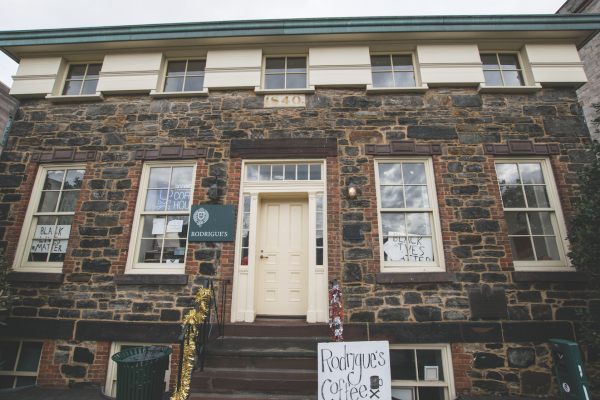Coffeehouse Clash Gains National Attention
The Dec. 7 incident at Rodrigue’s Coffee House has reignited the free speech debate at Fordham. (ANDREW BEECHER/THE OBSERVER)
January 25, 2018
College campuses are no stranger to political controversy. Over the past year, universities have drawn controversial speakers, protests, and explosive confrontations between many different groups of students. As Fordham’s political activism begins to inch toward the media spotlight, the question of how to continue the political conversation and find common ground becomes more relevant than before.
Rodrigue’s Coffee House, a Rose Hill based student business, became national news in December after an employee was recorded asking students Aaron Spring, Fordham College at Rose Hill ‘19, Sebastian Balasov, FCRH ‘18, Michael Esposito, FCRH ‘19, Colton Hillman, FCRH ‘19, and several others to leave if they did not remove hats that were considered a violation of the coffee house’s Safer Space policy.
The coffee house’s safe space guideline prohibits racism, sexism and homophobia within the establishment and states that “ideas or actions” in violation of the guidelines “are not welcome.”
“MAGA wear is used as propaganda for movements that stand in opposition to our safer space policy because it is used as a threatening display against minority communities,” the coffee house said in a statement to the Fordham Observer.
The action was intended to be “free-speech exercise,” according to Balasov, the president of College Republicans, in an interview with the Fordham Ram. It was not part of an official event endorsed by the club, but instead an idea mentioned after the conclusion of the group’s Nov. 30 meeting.
In the video, Kristal Ho, FCRH ʼ18, informs the groups that they have to take off their Make America Great Again (MAGA) hats or leave. Ho then responds to Esposito’s protests by saying, “I’m protecting my customers.” Later in the video, Ho replies to another student, stating, “I don’t want people like you supporting this club,” adding “You are wearing hats that completely violate our safe space policy. I’m telling you to take it off or you have to go.”
On their official Facebook page, the club stated that The Fordham College Republicans “in no way sponsored nor endorsed” the events that occurred on December 7, but that the group does support “each individuals right to freedom of expression and right to feel safe anywhere on campus” and condemns “any form of interference of these unalienable rights and thought discrimination of any kind.”
Jacob Linker, FCRH ʼ18 and President of the Fordham Libertarians, believes that Fordham’s culture is based around avoiding controversy rather than addressing issues head-on, and that in doing so, the university becomes more susceptible to sporadic, hostile conflicts.
“The effect of this is that things just boil up and overflow, with controversy ensuing every time because it ends up being fairly novel compared to the norm. If things were allowed to flow more naturally, odds are whatever crazy stupid stuff idiots spout would just be looked at and shrugged,” Linker said.
Linker believes that students “have every right” to look at people engaging in “controversial, triggering and trollish discourse” and form their own opinion on the individual’s actions, but that it is important not to overreact to those trying to antagonize.
“Unless the obnoxious are really crossing a line — getting in people’s personal bubbles, interfering with other students’ activities, specifically calling people out, causing physical harm — I think the only way we can really function is to just accept that there’s some stupid, nasty people in the world,” Linker said. “It’s the responsibility of sensible, temperate, responsible people to not give them any more attention than necessary.”
After the video went viral and garnered national press, Fordham president Rev. Joseph M. McShane, S.J., addressed the incident in a university-wide email, clarifying that the university does not have a safe space policy, “nor any policy that excludes members of the Fordham community from any public space on campus on the basis of their political views.”
Stating that the university itself should be a “safe space,” or an environment where all of the university community are free to share their opinions, McShane also added that it should also be a space where students are “respectfully tested” by others.
“Rather than try to shield students from the world’s sharp edges, I hope and believe that a Fordham education can and should make them more resilient and better prepared — intellectually, morally and spiritually — to engage the world on their own terms,” McShane wrote.













Isabel • Aug 7, 2020 at 2:29 pm
Kristal Ho and the other Chinese anchor babies need to go back to the communist country they love. Their gas lighting doesn’t work. The fascists are those who do not tolerate different views.
If she cared about human rights violations, racism and fascism she wouldn’t be virtue signaling about baseball hats. She would be advocating for the victims of Tinamen Square, and the political prisoners currently used as slave labor in China. Those the Communist Chinese Party are forcibly sterilizing and having their organs harvested because they are pro democracy, or Muslim.
Noel Cordero • Jan 26, 2018 at 1:35 pm
So when are we bringing Sen. Kamala Harris, or Sen. Cory BOOKER to Fordham?